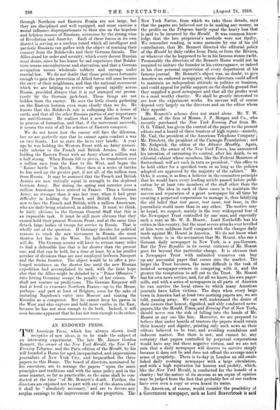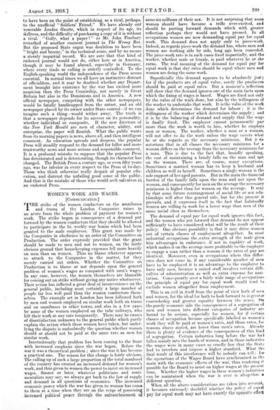AN ENDOWED PRESS.
rrHE American Press, which has always shown itself receptive of new ideas, is to be made the subject of an interesting experiment. The late Mr. James Gordon Bennett, the owner of the New York Herald, the New York Evening Telegram, and the Paris edition of the Herald, by his will founded a Home for aged, incapacitated, and impecunious journalists of New York City, and bequeathed the three papers to this Home. The board of directors, nominated by his executors, are to manage the' papers " upon the same principles and traditions and with the same policy and in the same manner, so far as practicable, as the same shall be con- ducted at the time " of Mr. Bennett's death. Further, the directors are enjoined not to part with any of the shares unless it shall be " absolutely necessary," and are to devote any 'surplus earnings to the improvement of the properties. The New York Nation, from which we take these details, says that the papers are believed not to be making any money, as the profits on the Telegram barely equal the heavy loss that is said to be incurred by the Herald. It was common know- ledge that the late proprietor's methods were not thrifty. We remember reading, in some memoirs by one of his old contributors, that Mr. Bennett directed the editorial policy of the Herald by daily cables from Paris, or from the Riviera, or wherever else he happened to be in his famous steam-yacht. Presumably the directors of the Bennett Home would not be required to imitate the founder in his extravagance, or indeed in his close personal supervision of every department of his famous journal. Mr. Bennett's object was, no doubt, to give America an endowed newspaper, whose directors could afford to maintain an independent attitude in politics or business. and could appeal for public support on the double ground that they supplied a good newspaper and that all the profits went to a most worthy charity. We shall be greatly interested to see how the experiment works. Its success will of course depend very largely on the directors and on the editor whom they appoint. Mr. Bennett's scheme does not stand alone. Mr. T. W. Lamont, of the firm of Messrs. J. P. Morgan and Co., who recently purchased the New York Evening Post from Mr. 0. G. Villard, has given the control of the paper to the present editors and a board of three trustees of high repute—namely. Mr. Vail, the president of the American Telephone Company ; Mr. Pritchett, the president of the Carnegie Foundation ; and Mr. Sedgwick, the editor of the Atlantic Monthly. Again, Mr. Ochs, the owner of the New York Times, has announced his intention of entrusting its control, after his deith, to an editorial cabinet whose members, like the Federal Ministers of Switzerland, will act each in turn as president, " this office to be held either for a speCified term or as long as the policies adopted are approved by the majority of the cabinet." Mr.. Ochs, it seems, is so firm a believer in the committee principle that he would have every leading article passed before publi- cation by at least two members of the staff other than the writer. The idea in each of these cases is to maintain the success and reputation of a great newspaper for all time by creating a perpetual corporation to manage it, thus falsifying the old belief that tout passe, tout casse, tout lasse, in the journalistic world more than in any other. The motive may be found, we suspect, mainly in the very widespread fear of the Newspaper Trust controlled by one man, and especially such a man as Mr. W. R. Hearst. Lord Northcliffe has his critics in this country, but the most severe attacks ever levelled at him were mildness itself compared with the charges daily made against Mr. Hearst in America. We do not know what truth there is in the accusation that Mr. Hearst, who ran a German daily newspaper in New York, is a pro-German.
But the New Republic in its recent criticism of Mr. Hearst goes far beyond this particular charge. It is obvious that a Newspaper Trust with unlimited resources can buy up any successful paper that comes into the market. The larger the Trust becomes, the more difficult is the task of isolated newspaper-owners in competing with it, and the greater the temptation to sell out to the Trust. Mr. Hearst has his own news service, and, for all we know, his own paper- mills, and with a series of newspapers in all parts of America he can survive the local crises to which many American journals have fallen victims. The days when every large town in America had at least two morning papers are, we are told, passing away. We can well understand the desire of their owners that honest, dignified, and ably conducted news- papers, like the Herald, Times, and Evening Post of New York, should never run the risk of falling into the hands of Mr. Hearst or any one like him. Moreover, we are prepared to believe that under boards of trustees the papers would retain their honesty and dignity, printing only such news as their editors believed to be true, and avoiding scandalous and indecent matter. But there is not, and cannot be, any certainty that papers controlled by perpetual corporations would have any but these negative virtues, and we are not sure that a daily newspaper will deserve to survive simply because it does not lie and does not offend the average man's sense of propriety. There is to-day in London an old-estab- lished daily morning newspaper with a large circulation, and with a high reputation for honour and probity, which, like the New York Herald, is conducted for the benefit of a charity; but the nature of its success as an organ of opinion may be judged from the fact that probably few of our readers have ever seen a copy or even heard its name.
No American, of course, would consider the possibility of a Government newspaper, such as Lord Beaverbrook is said to have been on the point of establishing, as a rival, perhaps, to the unofficial " Soldiers' Friend." We have already our venerable London Gazette, which in respect of its age, its deillness, and the difficulty of purchasing a copy of it is without a rival. " Golly, what a paper ! " as Mr. John Finsbury remarked of another eminent journal in The Wrong Box. But the proposed State organ was doubtless to have been " bright and breezy," in the technical sense, and by no means a sternly impartial record. We are sure that that kind of endowed journal would not do, either here or in America, though it may be found abroad, especially in Germany, where every trade or calling is strictly controlled. To the English-speaking world the independence of the Press seems essential. In normal times we all have an instinctive distrust of officialdom, and it may be doubted whether any Depart- ment brought into existence by the war has excited more suspicion than the Press Censorship, not merely in Great Britain but also in the Dominions and in America. A new official newspaper, competing with the other newspapers, would be fatally handicapped from the outset, and an old newspaper placed by its owner under State control—if we can imagine such a thing—would wither away. The truth is that a newspaper depends for its success on its personality, whether individual or composite. If the new directors of the New York Herald are men of character, ability, and enterprise, the paper will flourish. What the public wants from its morning papers is news, above all, and then intelligent comment. As education spreads and deepens, the popular Press will steadily respond to the demand for fuller and more trustworthy news and more serious and responsible comment. It is a profound mistake to suppose that the popular Press has deteriorated and is deteriorating, though its character has changed. The British Press a century ago, or even fifty years ago, was far inferior in every respect to the Press of to-day. Those who thkk otherwise really despair of popular edu- cation, and distrust the unfailing good sense of the public. And that is the mistake of those who would seek salvation in an endowed Press.



























 Previous page
Previous page